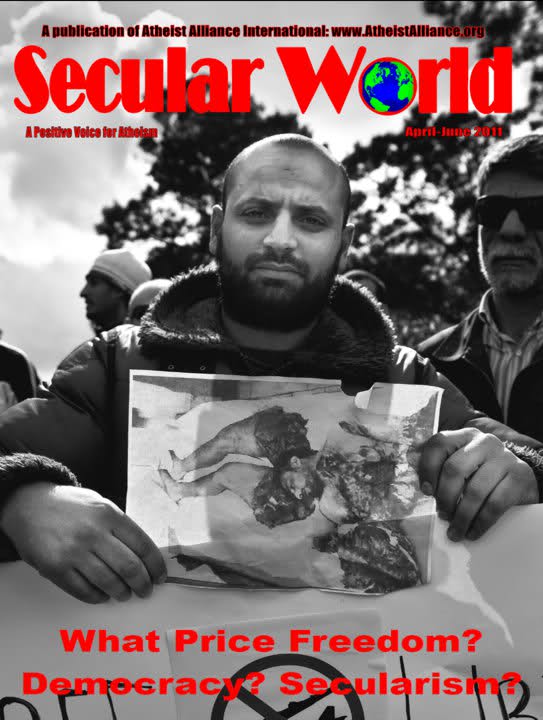I’ve been putting off writing this piece for several days. News of the people’s revolutions in the Muslim countries of North Africa and the Middle East is constantly changing,and keeping up with all the developments is daunting. Hundreds have died in these people’s current fights for freedom, thousands in the past under their repressive regimes, tens of thousands. Horribly maimed. Indescribably tortured. Things done to people just wanting freedom that make you wonder how one person can do such things to another. But today, March 20th, is the 55th anniversary of the day Tunisia gained independence from France, and today I sit and write.
And I do so because atheists need to take serious note of what’s happening. Most of us have the freedoms the people in these Muslim countries do not, but there’s an entrenched hatred, perhaps fear, maybe both, against us, and there is a reason many of us stay in the closet, just as two of this issue’s contributors do, because if their atheism were known they have no doubt they would be fired, blacklisted, and possibly worse. I know. I did. I’m there.
Today is no doubt a day of great satisfaction and pride for the Tunisian people, not only for their historic independence but also for the more recent and perhaps even more historic actions: It is the Muslim country whose people started the freedom revolution to depose their dictator and seek a secular and democratic government, and succeeded in doing so earlier this year. And the seed it planted has taken root in virtually every other Muslim or Muslim majority country in the area since.
Yesterday, in Egypt, citizens lined up all day to cast their votes – they even had to extend the polling hours into the night – on amendments to their Constitution granting more democratic rights and open government, after a relatively short and amazingly peaceful people’s revolution, pretty much sanctioned by the military. Hosni Mubarak, if not willingly, eventually stepped down. And in a sign of the new times there, when the governor of Cairo cut in line to cast his vote, he was promptly tossed out by the newly franchised citizenry.
Tunisia and Egypt aside, and excluding Turkey, peaceful revolution doesn’t seem to be the case in the rest of this Muslim region, as the rest of the Muslim world peoples still seek that elusive thing we in the western world take for granted: Freedom. With the exception of tiny Bahrain, whose majority Shiite populace is rising up against the ruling Sunni monarchy and may have religious factional overtones, all of the people’s revolutions in all of the Muslim countries are originating with the people in those countries for democracy, secularism, and civil rights. The entrenched Muslim leaderships in Algeria, Djibouti, Yemen, Oman, Bahrain, Saudi Arabia, Morocco, Jordon, Syria, Iran, Western Sahara, and the West Bank and Gaza Strip – who normally blame the West for any and all insurgencies in their countries, any fomenting, any revolution, any desire for democracy and civil rights – now have no scapegoat.
And they don’t want to leave either, to give up power, to give up without a fight. The most despotic of which is Libya’s Moammar Gadhafi, who has vowed, after freedom-seeking rebels took control of nearly all of the eastern half of the country, including key port cities and oil refineries, to never give up, to never leave, to destroy all who would destroy him (or just have him leave peacefully).
Earlier today France, Britain and the U.S., under a United Nations resolution, finally took to the skies to enforce a no-fly zone over Libya – pleaded for by freedom fighters who began to be battered by the superior Libyan military forces.
The French seemed adamant on taking the lead as its fighter jets took to the sky just after British and U.S. ships and subs launched cruise missiles to take out Libyan military facilities that would detect the jets. Arab countries are supposed to join in soon with their jets to help keep the no-fly zone. That remains to be seen. With the billions of dollars in military aid to Arab countries for jet fighters, and billions of dollars of jet fighters purchased by other Arab countries, you’d think they wouldn’t need the West’s involvement as they have plenty of jet fighters themselves to handle Libya. But there seems to be a rule against Muslim Countries coming to the military aid of another Muslim country, unless it serves their own interest.
Which brings us back to Bahrain, that speck of an island off the coast of Saudi Arabia. Saudi Arabia doesn’t want its own Shiite population, a large majority of which are in the eastern half of that country, to get any ideas, so the Saudi monarchy, one of the most repressive of all regarding civil rights, especially for women, sent in a few thousand soldiers to help Bahrain quash its freedom fighters.
It has billions of dollars of U.S. jet fighters, but hasn’t helped out in Libya. Don’t expect to see it do so, either.
Yemen continues to attack its freedom fighters. So does Algeria. Syria and Jordon are taking measures. Morocco and Western Sahara seem relatively peaceful in their protests at the moment, with police taking a watchful eye, but the freedom itch is there as well. At home, Saudi Arabia and other oil-rich countries are bribing the populace by increasing subsidies on various services and products in an attempt to keep their subjects happy, but it’s a delay tactic at best.
Repressive regimes seem to abound in the Muslim world, perhaps tied to Islam and its strict cultural adherences, which keep the populations in these countries in strict order. But the Internet, satellite dishes, cell phones, Facebook, Twitter, and any number of other outlets that can only be controlled so much by the dictators, now get the info and images of the freedoms others, including Muslims, have in other countries to their population, and they want the same: The freedom to choose, the right to democratically vote, a secular government that guarantees them their religion, or no religion.
It remains to be seen how it all plays out. Tunisia and Egypt set the best current example – their torturous and repressive past not withstanding. However, just because their populaces have their new freedom doesn’t mean everything will be easy. In Egypt, the populace state they want a secular, democratic government. Yet women, who stood side-by-side with the men during the entire time of that peaceful revolution, aren’t so sure that’ll happen. After it was all said and done, several hundred women marched for equal rights for Egyptian women and were heckled, jostled and threatened, and told to go home and take care of the kids.
We don’t know how it will turn out. We don’t know if Libya will see freedom. We don’t know if democracy will rise up with the people of Yemen. We don’t know if Saudi Arabia will finally let women drive.
What we do know is that tens of thousands more will die seeking freedom from repressive regimes and religious tyranny, seeking democracy and creating a secular society where religion, any religion, doesn’t dictate government and control every aspect of your life. And they will die in horrible ways, many tortured just like in the past. Why do they do it?
Because they want freedom.
I was debating a choice of covers for this issue, all dealing with the fights for freedom in North Africa and the Middle East. One involved an area map with various text grab lines. Others were equally mundane. All spoke to the point of what was happening, yet none hit the mark. Except one. The one you hold in your hand. I wasn’t sure if it was appropriate to use it, as its sheer horror was perhaps too graphic. And then, on the radio in the background, I realized what was being sung: This is Why We Fight, by The Decemberists:
Come the war
Come the avarice
Come the war
Come hell
Come attrition
Come the reek of bones
Come attrition
Come hell
This is why
Why we fight
Why we lie awake
And this is why
This is why we fight
When we die
We will die
With our arms unbound
And this is why
This is why
Why we fight
Come hell
Bride of quiet
Bride of all unquiet things
Bride of quiet
Bride of hell
Come the archers
Come the infantry
Come the archers
Of hell
This is why
Why we fight
Why we lie awake
This is why
This is why we fight
And when we die
We will die
With our arms unbound
And this is why
This is why we fight
Come hell
Come hell
This is why
Why we fight
Why we lie awake
This is why
This is why we fight
When we die
We will die with our arms unbound
And this is why
This is why we fight
So come to me
Come to me now
Lay your arms around me
And this is why
This is why
We fight
Come hell
Come hell
Come hell
Come hell
And then I knew I had the right cover. Yes, it’s very graphic. But the lone man holding the photo of a dismembered, disemboweled person – a family member perhaps, a loved one, maybe he was a total Stranger – it didn’t matter. The resolute sadness of the man,the resolute determination, the sheer horror of what he’s holding. This is why they seek Freedom. Democracy. Secularism.
The “Come hell” refrain refers to the phrase “Come hell or high water”, meaning that they and you and I will keep on fighting until the very end, no matter what happens. They’re going to keep fighting for it regardless of things that seem to, or do, stand in their way. Regardless of how long it takes. Regardless of how many dismembered, disemboweled bodies.
And this is why we must continue to fight for our rights, our freedom. We must fight in the ways we can with the freedom we have, to keep that freedom, the freedom to live our lives as we want to, to not believe or be forced to believe in things, to be able to be ourselves without fear. We must fight to keep our society from falling back into what the Muslim peoples of North Africa and the Middle East are struggling so very desperately to climb out of.
This is why we fight. You and I. Come hell or high water.

Tom Melchiorre is the Editor-in-Chief of Secular World, the magazine of Atheist Alliance International (www.atheistalliance.org)
This article was first published in the April June issue of Secular World and is reprinted here with permission.
By Tom Melchiorre
